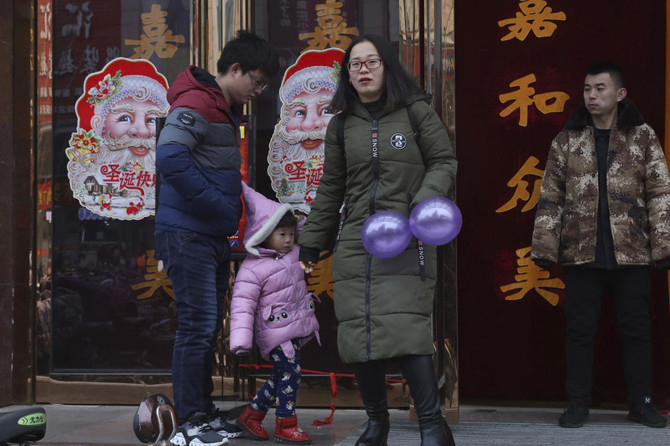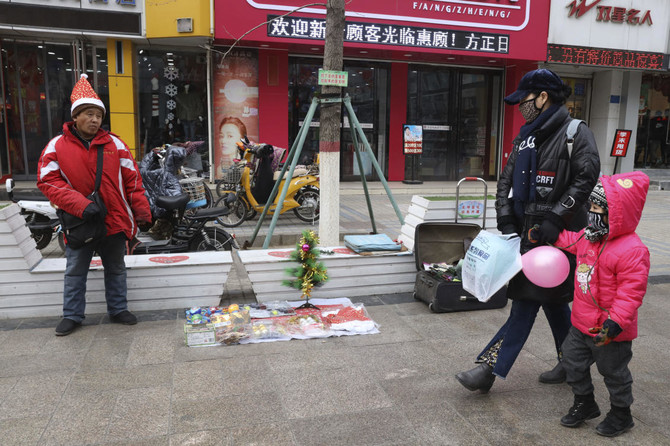SHANGHAI: It took less than 24 hours for all the Christmas trees, lights and bells to disappear from a 27-story shopping and office complex in the Chinese city of Nanyang.
Even the giant teddy bear at the mall entrance wasn’t spared, said Ma Jun, who works at a tutoring company in the building.
“Everything is gone and cleaned,” she said.
Christmas continues to be a shopping festival across most of China, with huge trees adorning shopping malls in Shanghai and Beijing, but a growing emphasis on traditional culture by the ruling Communist Party and the systematic suppression of religion under President Xi Jinping are imperiling Santa Claus’s position.
At least four Chinese cities and one county have ordered Christmas decorations banned this year, according to official notices and interviews. Students, teachers and parents from 10 schools around China told The Associated Press that Christmas celebrations have been curtailed.
“The ongoing local reaction against Christmas is part of the wider sentiment since Xi took power,” said Zi Yang, a China expert at the S. Rajaratnam School of International Studies in Singapore.
Xi is trying to broaden the appeal of the Communist Party by casting it as a crusader for Chinese tradition in a fast-changing world, he said. “Therefore, foreign cultural elements such as Christmas are placed on the chopping block.”
The seasonal humbug follows similar outbreaks of anti-Christmas rhetoric in 2014 and 2017. It appears not to be centrally organized, but rather a spreading resistance to foreign festivals by local authorities seeking to align themselves with the growing tide of cultural nationalism.
The squeeze on Christmas is an example of how efforts to “normalize” thinking bleed into the everyday lives of many Chinese. That push exploded into view this year through re-education camps for Uighur Muslims and a crackdown on Christian churches that has continued with force in recent weeks.
In Nanyang, about 950 kilometers (600 miles) west of Shanghai, government officials stopped by the office and shopping complex on Dec. 16 to say that Christmas decorations would have to come down, said Ma, the tutoring company employee.
An official from the city’s urban management bureau hung up when asked for comment.
Nine hours by car south, Hengyang, a city in Hunan province, said in a Dec. 19 notice posted on an official government social media account that anyone caught holding Christmas sales or celebrations that blocked the streets would be punished. Communist Party members, the notice said, should avoid foreign festivals and instead be “models of adherence to Chinese traditional culture.” Hengyang police posted a video on their official social media account of locals discussing the importance of Chinese culture and plans to avoid ostentatious Christmas celebrations.
Langfang city, just south of Beijing, banned Christmas stage performances and merchandising promotions, according to a notice circulated on social media.
Shop windows were to be stripped of Christmas stickers and streets kept free of Christmas banners and lights. Law enforcement patrols were to be stepped up Dec. 23-25 to prevent illegal signs of celebration.
The Langfang urban management bureau declined comment. The state-run Global Times newspaper argued that Western media are exaggerating China’s crackdown on Christmas and reported that the restrictions in Langfang were aimed not at Christmas but at cleaning up roadside stalls and migrant vendors in hopes of winning a “National Civilized City” award from the Communist Party.
Some 270 kilometers (167 miles) west, Fuping county, also in Hebei province, issued a similar clean-up notice. Though the Dec. 21 announcement mentions Christmas eleven times, an official from the Fuping urban management bureau said the rules were aimed at street vendors generally, not Christmas.
Police in the Panlong district of Kunming, the capital of Yunnan province in southern China, circulated a notice that hotels, karaoke parlors, Internet cafes, bars and other crowded places must prohibit Christmas-related decorations and activities.
“It is forbidden to hang Christmas stockings, wear Christmas hats, place Christmas trees, and so on,” the notice read.
It wasn’t clear if the notice applied to all of Kunming city, though a police officer told the AP that the order to circulate it came from city officials.
Reverend Jonathan Liu, founder of the Chinese Christian Fellowship of Righteousness, a California nonprofit, said the pushback against Christmas reflects Xi’s efforts to “Sinicize” religion.
Preachers are coached on how to convey Communist Party core values in their sermons and national flags and songs have been injected into some church services, he said.
Liu provided the AP with a notice sent to churches in Zhoukou, a city to the east of Nanyang in Henan province.
It tells churches to vet Christmas plans with the government, forbids minors from participating in Christmas events and caps expenses at 2000 yuan ($290). “I wish you all a happy Christmas! God bless you,” read the notice, which Liu received from a pastor in China.
An official at the United Front Work Department in Zhoukou referred queries to the religious affairs bureau, which could not be reached for comment.
Before becoming president, Xi went to Finland in 2010 and was photographed with Santa Claus. That kind of chumminess appears to be a thing of Christmas past, experts say.
The central government issued guidelines last year for a cultural revival project that calls for a marked boost in the international influence of Chinese traditional culture by 2025.
“You have a culturally conservative ethos in the country that has definitely been encouraged by the central party-state,” said Guo Yingjie, a professor of Chinese studies at the University of Sydney. “It’s not hard for university presidents or officials to say, ‘OK celebrating Christmas can easily be seen as de-Sinification or promoting Western culture.’“
Students have taken to social media to complain about restrictions on Christmas celebrations at their schools.
At a top Shanghai university, a student union had its Christmas plans canceled for the first time, an organizer told the AP on condition of anonymity, fearing rebuke.
The students came up with a solution: By replacing “Christmas” with “New Year’s” in their activity proposal and changing the date from Dec. 25, it sailed past school administrators.
Students in the city of Qingdao were reprimanded for hosting an event about gratitude on Thanksgiving Day and warned not to celebrate Christmas publicly, according to a student, who also spoke on condition of anonymity, fearing retribution.
Liu Kaiming, president of the Institute of Contemporary Observation, a civil society group in the city of Shenzhen, said that despite the drumbeat of official discontent, Christmas cheer continues to spread in China.
“The sound of resistance is more powerful on the surface, but it has no practical effect,” he said. “Young people’s enthusiasm for the festival is ever-increasing.”
Santa not coming to towns across China
Santa not coming to towns across China

- Christmas remains a shopping festival across most of China
- At least four Chinese cities and one county have ordered Christmas decorations banned this year
WHO sees low risk of Nipah virus spreading beyond India
- The virus spreads to humans from infected bats, or fruit they contaminate, but person-to-person transmission is not easy
- Hong Kong, Malaysia, Singapore, Thailand and Vietnam are among the Asian locations that tightened airport screening checks
HYDERABAD: There is a low risk of the deadly Nipah virus spreading from India, the World Health Organization said on Friday, adding that it did not recommend travel or trade curbs after two infections reported by the South Asian nation.
Hong Kong, Malaysia, Singapore, Thailand and Vietnam are among the Asian locations that tightened airport screening checks this week to guard against such a spread after India confirmed infections.
“The WHO considers the risk of further spread of infection from these two cases is low,” the agency told Reuters in an email on Friday, adding that India had the capacity to contain such outbreaks.
“There is no evidence yet of increased human to human transmission,” it said, adding that it has coordinated with Indian health authorities.
But it did not rule out further exposure to the virus, which circulates in the bat population in parts of India and neighboring Bangladesh.
Carried by fruit bats and animals such as pigs, the virus can cause fever and brain inflammation. It has a fatality rate ranging from 40 percent to 75 percent, with no cure, though vaccines in development are still being tested.
It spreads to humans from infected bats, or fruit they contaminate, but person-to-person transmission is not easy as it typically requires prolonged contact with those infected.
Small outbreaks are not unusual and virologists say the risk to the general population remains low.
The source of infection was not yet fully understood, said the WHO. It classifies Nipah as a priority pathogen because of a lack of licensed vaccines or treatments, a high fatality rate, and a fear it could mutate into a more transmissible variant.
NIPAH NOT NEW TO INDIA
The two health workers infected in India’s eastern state of West Bengal late in December are being treated in hospital, local authorities have said.
India regularly reports sporadic Nipah infections, particularly in its southern state of Kerala, regarded as one of the world’s highest-risk regions for the virus, linked to dozens of deaths since it first emerged there in 2018.
The outbreak is the seventh documented in India and the third in West Bengal, where outbreaks in 2001 and 2007 were in districts bordering Bangladesh, which reports outbreaks almost annually, the WHO said.













